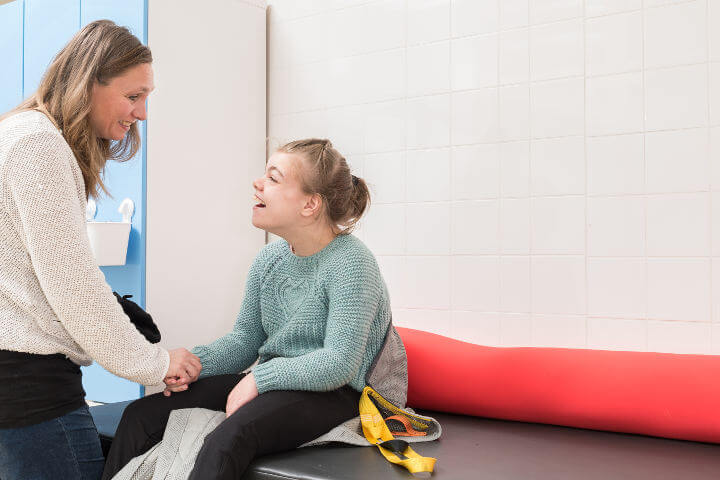
Simon says, “Touch your toes!”
Simon says, “Wiggle your nose!”
Simon says, “Reach to the sky!”
Who doesn’t love a game of Simon Says? The game invites everyone to play a part in the same fun and funny actions. The person who stands in the role of “Simon” shifts from person to person, so everyone gets the opportunity to be in charge and call the action.
The reason why the game works well is that its based on our very human delight in patterns. “Simon” will let you know what you’re about to do, and you get to figure out how to participate. Everyone playing is invited to share in the fun of the action.
Caring for someone with special needs at home asks for a similar attitude of playfulness and invitation as a game of Simon Says. While there is a set of directions for players to participate, there is freedom in the boundaries of the game. Similarly, at home, there are all sorts of things that need to be accomplished, such as hygiene care, mealtimes, and social opportunities, but they can be accomplished with a great degree of playfulness, delight, and common purpose for everyone involved.
The Basics
The most effective home care for individuals with special needs covers all major facets of daily living. By involving the patient in daily activities, the benefits will inevitably include a greater ability for the patient to take a leading role in the routine. Furthermore, the patient will retain greater physical, mental, and relational connections. Here are some things to consider:
- Does the person you care for love to cook (and eat!)? Simon says, “pour the broth into the soup pan!” Plan the weekly menu together. You do the grocery shopping, then return to prepare the meal, serving as your loved one’s sous chef based on their ability to participate.
- People with special needs, like all people, frequently take pride in the place where they live, especially as a sign of their individuality and personality. Simon says, “Dust the end table!” Ask your loved one about things he or she might want to keep especially clean and cared for, or perhaps displayed prominently. Consider the details that are important to the home life of your loved one and find safe and effective ways for him or her to help maintain the space, both for the sake of space and to keep a consistent schedule of participation in the upkeep of your home. This allows the person you care for to keep pride in managing their possessions and space, especially when friends or family come to visit.
- Visiting with others is an important, life-giving part of any one person’s life, including special needs patients. Simon says, “play a game!” If your loved is not able to get out often to shop together with a caretaker, attend religious services, socialize then consider the option to set times to invite friends and family over for a meal or activity together. Assist your loved one in planning food to be served and organizing the event. Empower the person you serve to socialize as much as possible so time to gather with others at home is still a prominent joy and feature of daily life.
Fun Project Ideas
Special needs patients frequently yearn for ways to express love and affection to friends, family, and other caretakers or special people. Simon says, “Give a gift!” A benefit of at-home care for special needs patients is the caretaker’s ability to know both the special people in his or her life and to know what kinds of things they’d like to share as relationship-strengthening signs of appreciation. As a caregiver, you can collate materials for a special crafts project and create a comfortable, accessible workstation. You can also help your loved one wrap their gift and either send it or present it to its intended recipient. The benefits of at-home care for a special needs patient is the ability to help that person remain connected in stable, loving relationships.
Also, as with any age, playing together is important. Simon says, “Touch your toes!” When caring for a special needs patient, games are often an easy way to both engage a persons mind, but potentially get them the exercise they need for a healthy body and reduced physical discomfort. Find ways to incorporate active play in the daily routine that keeps both minds and bodies sharp. In many cases, a caregiver will enjoy participating and your loved one may start to take the lead when organizing similar activities from day to day.
The Most Important Part
The key to interactive and fun home care for special needs patients is to do as much as possible together. Whether  active or passive, people thrive when they feel connected to the environment and people around them. Through conversation get to know the person you care for and discover their passions. Find ways to engage those interests in ways that promote happiness and health. Help your loved one to participate in the fun of simple, accessible daily patterns.
active or passive, people thrive when they feel connected to the environment and people around them. Through conversation get to know the person you care for and discover their passions. Find ways to engage those interests in ways that promote happiness and health. Help your loved one to participate in the fun of simple, accessible daily patterns.
When you provide care for a special needs patient at home, it’s rarely a matter of doing work for the person. Instead, it’s a matter of creating patterns and enjoyment at home together with the person. Find ways to engage your loved one in “the game.” Give your special needs patient activities that add fun to their day, and in developing those patterns, the person is likely to be able to take on some of the daily needs of life on for themselves.
Contact Caring Hands Matter Today!
For more information on the benefits of home care for individuals with special needs, please contact Caring Hands Matter online or call to learn more about the benefits of home care services in Fairfax VA including services for individuals with special needs.